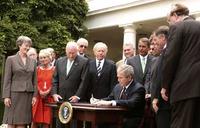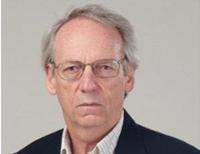-
Deal would delay by two months $110 billion in automatic spending cuts

The deal agreed on by Senate minority leader, Mitch McConnell (R-Kentucky), and Vice President Joe Biden, and which was passed in the Senate in the early hours of New Year’s Day, would also delay, by two months, the $110 billion in automatic spending cuts which were set to go into effect on 3 January2013
-
-
Privately funded gun buy-back programs proliferate

In the aftermath of the Connecticut mass shooting, private donors have donated hundreds of thousands of dollars to cities around the United States to fund gun buy-back programs; thousands of guns – and two rocket launchers – have been collected, but the impact on a gun-saturated society is likely to be small: this year alone the FBI has recorded 16.8 million instant background checks of gun buyers, 400,000 more than last year, which was a record year
-
-
President Obama signs private bill giving Nigerian student U.S. residency
President Barack Obama granted a Nigerian immigrant his wish, signing a rare private bill into law granting the immigrant permanent residency in the United States; Victor Chukwueke came to the United States eleven years ago to undergo treatment for massive facial tumors, and stayed, on an expired visa, to graduate from Wayne State University; he wants to attend medical school, but in order to do so he needed a green card
-
-
Egypt launches investigation of opposition leaders
Three days after President Mohammed Morsi signed a decree to make the new Egyptian constitution the law of the land, the public prosecutor of Egypt has ordered an inquiry of three prominent opposition leaders; the inquiry will look into charges that the three leaders — Mohamed ElBaradei, Amr Mousa, and Hamdeen Sabahi —“incited the overthrow” of President Morsi
-
-
Gun training for teachers gaining in popularity
Two hundred teachers in Utah are set to receive special firearms training — with a plastic gun — in order to carry concealed weapons in their classrooms in the future; in the aftermath of the mass shooting in the Sandy Hook Elementary School in Connecticut, gun training and gun safety classes for teachers are drawing attention
-
-
Broader background checks, denial criteria may help prevent mass-shooting catastrophes
Garen Wintemute, a leading authority on gun violence prevention and an emergency medicine physician at the University of California, Davis, believes broader criteria for background checks and denials on gun purchases can help prevent future firearm violence, including mass shooting catastrophes such as those that occurred at Sandy Hook, Aurora, Virginia Tech, and Columbine
-
-
Proliferation of license plate readers worry privacy advocates
Automated License Plate Recognition (ALPR) technology has taken off in recent years, and the police says it is the greatest innovation since fingerprints and DNA; the technology has changed the way police finds cars connected to crimes, but in the process it has upset many privacy advocates
-
-
Commander of Syria’s military police defects

The disintegration of Presdient Bashar al-Assad’s regime continues, as another high-ranking loyalist — Lt. Gen. Abulaziz al-Shalal, commander of Syria’s military police — has defected; al-Shalal, who is now in Turkey, is one of the highest-ranking officials to join the ranks of the anti-regime rebels
-
-
Fiscal cliff discussions get in way of post-Sandy relief measure
The post-Sandy rebuilding effort in the northeast has been stalled by the debate going on in Congress about a solution to the national debt
-
-
Louisiana parishes to encrypt police radio communication
First-responder agencies in Orleans, Jefferson, St. Bernard, and Plaquemines parishes in Louisiana will soon be encrypting all emergency radios, keeping emergency response chatter out of the ears of the public; the police says the encrypted communication is needed in order to keep criminals from gaining information on police by listening to scanners, but a police union and crime-prevention groups are worried that the encrypted system would prevent the media from monitoring police activity, and hobble neighborhood watch organizations from keeping their neighborhoods safe
-
-
Morsi signs decree putting new Egypt’s constitution into effect
Egypt’s president Mohamed Morsi signed a decree Monday putting into effect Egypt’s just-approved constitution; Morsi signed the decree after two rounds of a referendum in which the voters approved the document by a nearly 2 to 1 ratio
-
-
Major surveillance law heading toward its own end-of-year cliff

While coverage of the tense negotiations over a resolution to the fiscal cliff threat has dominated the media, the Foreign Intelligence Surveillance Amendments of 2008 is heading for a cliff of its own, as the provisions of the act are set to expire at the end of the year
-
-
U.S. soldier accused of killing 16 Afghan civilian could face death penalt
A U.S. soldier accused of a mass murder could face the death penalty if he is found guilty; Staff Sgt. Robert Bales is accused of killing sixteen Afghan villagers and injuring another six in a shooting spree near a U.S. base in the Kandahar province last March
-
-
Part Two: NNSA and private contractors’ “nuclear safety culture” responsible for Y-12 security breach?

After Sister Susan Rice, age 82, and two other senior confederates allegedly broke into the Y-12 National Security Complex at Oak Ridge, Tennessee on 28 July 28th, initial spin on the breach at this highly secured facility focused upon blaming a lone security guard;the security breach at Y-12, however, should be more accurately understood as revealing a more systemic flaw: the breach was not the fault of a single guard, but as a security failure similar to other failures in a number of facilities under the purview of the National Nuclear Security Administration (NNSA) experiencing repeated security and safety lapses
-
-
In Oklahoma, even rumors of threat of school violence are taken seriously, and investigated
Threats of violence in schools must be taken seriously, even if the threats are nothing more than rumors; in Tulsa, Oklahoma, police and school officials take every threat seriously, even if it is nothing more than gossip
-
More headlines
The long view
Factories First: Winning the Drone War Before It Starts
Wars are won by factories before they are won on the battlefield,Martin C. Feldmann writes, noting that the United States lacks the manufacturing depth for the coming drone age. Rectifying this situation “will take far more than procurement tweaks,” Feldmann writes. “It demands a national-level, wartime-scale industrial mobilization.”
No Nation Is an Island: The Dangers of Modern U.S. Isolationism
The resurgence of isolationist sentiment in American politics is understandable but misguided. While the desire to refocus on domestic renewal is justified, retreating from the world will not bring the security, prosperity, or sovereignty that its proponents promise. On the contrary, it invites instability, diminishes U.S. influence, and erodes the democratic order the U.S. helped forge.
Fragmented by Design: USAID’s Dismantling and the Future of American Foreign Aid
The Trump administration launched an aggressive restructuring of U.S. foreign aid, effectively dismantling the United States Agency for International Development (USAID). The humanitarian and geopolitical fallout of the demise of USAID includes shuttered clinics, destroyed food aid, and China’s growing influence in the global south. This new era of American soft power will determine how, and whether, the U.S. continues to lead in global development.
Water Wars: A Historic Agreement Between Mexico and US Is Ramping Up Border Tension
As climate change drives rising temperatures and changes in rainfall, Mexico and the US are in the middle of a conflict over water, putting an additional strain on their relationship. Partly due to constant droughts, Mexico has struggled to maintain its water deliveries for much of the last 25 years, deliveries to which it is obligated by a 1944 water-sharing agreement between the two countries.
How Disastrous Was the Trump-Putin Meeting?
In Alaska, Trump got played by Putin. Therefore, Steven Pifer writes, the European leaders and Zelensky have to “diplomatically offer suggestions to walk Trump back from a position that he does not appear to understand would be bad for Ukraine, bad for Europe, and bad for American interests. And they have to do so without setting off an explosion that could disrupt U.S.-Ukrainian and U.S.-European relations—all to the delight of Putin and the Kremlin.”
How Male Grievance Fuels Radicalization and Extremist Violence
Social extremism is evolving in reach and form. While traditional racial supremacy ideologies remain, contemporary movements are now often fueled by something more personal and emotionally resonant: male grievance.
